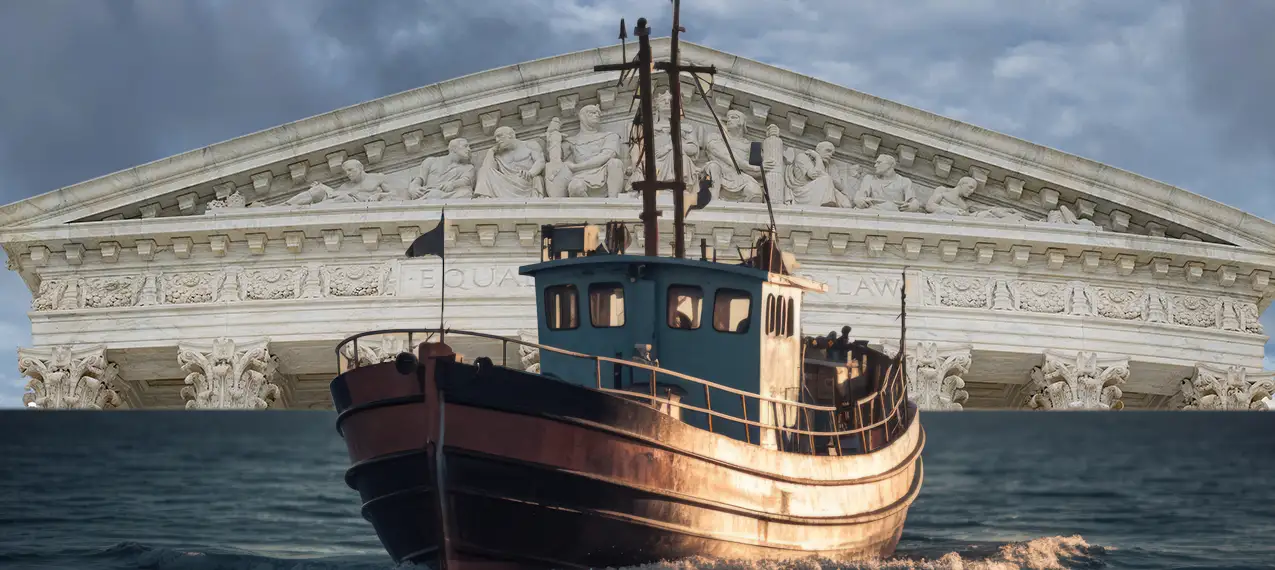
Last week, Landmark filed an Amicus Brief in Loper Bright Enterprises v. Gina Raimondo. This case involves attempts by the National Marine Fisheries Service (NMFS) to force fishermen to pay the salaries of federal monitors. These monitors, working for the NMFS, are required to periodically inspect the boats and fishing practices of groups such as Loper. In its brief, Landmark argues the Court should overturn a legal doctrine (based on the Supreme Court’s decision in Chevron v. National Res. Def. Council) that forces courts to defer to agency interpretation when statues are vague.
The government argues that it has its statutory authority under the Magnuson-Stevens Act (MSA) to force the operators of small fishing vessels to pay the aforementioned monitors. It justifies this action using three independent provisions of the MSA. The lower courts, bound by the precedent of Chevron, had to rule for the agency’s interpretation of the statute.
Landmark presents four arguments for overruling Chevron. First, Landmark notes that despite rulings from the Supreme Court over the past several years which have blocked instances of federal overreach via the Major Questions Doctrine, agencies continue to go beyond their statutory authority. They still believe themselves to be secure from challenge due to Chevron deference. Landmark argued that if our country is to restore the balance of powers and limit the size and scope of the administrative state, Chevron must be reversed. We argue, “Courts should not be obligated to reflexively defer to an agency’s ‘reasonable’ interpretation of ambiguous statutory provisions.”
Second, a major issue in this case lies in the fact that the statute is not ambiguous regarding how the NMFS is to be funded. As noted above, Chevron rests on the principle of ambiguity. Loper v. Raimondo stands apart from recent cases related to Chevron, because the agency did not rely on the interpretation of ambiguous language to justify its actions. Rather, the NMFS created these new rules out of thin air. If statutory silence is allowed to trigger Chevron deference, then any action that is not expressly prohibited by Congress may be considered permissible.
Third, Landmark argues that Chevron deference violates the principle of separation of powers. Article I of the Constitution vests Congress with the power to legislate. Article III empowers the courts to review and rule on the legality of government action. Chevron deference violates both. It allows administrative agencies to create powers that were not expressly delegated by the legislature, and it blocks courts from reviewing this conduct. Under Chevron, there is a clear accumulation of power in the executive branch, and agencies are given the leeway to act in any way they deem appropriate.
Finally, Landmark states that Chevron violates the Administrative Procedure Act (APA). The APA does not provide agencies with deference they have received since Chevron. On the contrary, it gives the courts the ability to determine “all relevant questions of law.” 5 U.S.C. § 706. The reading and interpretation of statutes is considered a relevant question of law, and therefore deference to agencies contravenes the APA.
Landmark’s brief discusses in detail the various problems with Chevron. Arguments are scheduled for this fall and a decision in this important case is expected by next summer.
Read the brief here
SUPPORT LANDMARK LEGAL FOUNDATION
We are truly facing existential threats to our individual rights and liberties, the Constitution, and our national character. If unchallenged, this assault on our very way of life will ruin our great nation. With your financial and moral support, Landmark is not going to let that happen without a fight. Will you join us?
JOIN OUR MAILING LIST
Never miss an update from Landmark Legal Foundation as we continue the fight to preserve America’s principles and defend the Constitution from the radical left.
Landmark will NEVER share your contact information and we will not flood your inbox.





